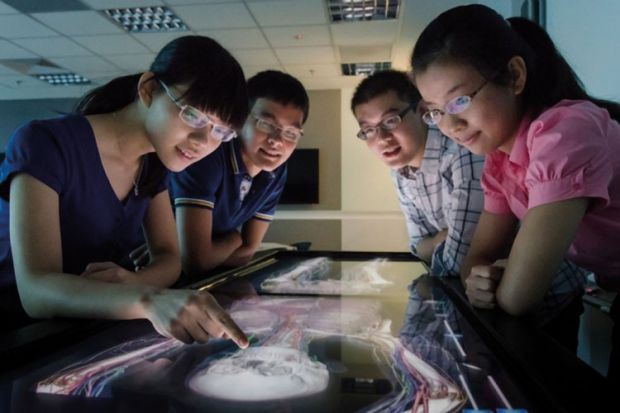Source: Nanyang Technological University
Boosting brain power: Nanyang’s rise in the rankings is ‘not a miracle, it’s a systematic building’, says Bertil Andersson
The potential for Western universities to forge links with Singapore is growing, but they should not take a “normative approach” on freedom of expression in the city state, according to the president of Nanyang Technological University.
Bertil Andersson spoke to Times Higher Education in London when he was part of a delegation led by Singapore’s president, Tony Tan, on the nation’s first state visit to the UK.
NTU, which has recently seen a dramatic rise in its global rankings positions and citation impact scores, has opened a medical school in Singapore in a joint venture with Imperial College London. The partnership “may be one of the most spectacular academic joint ventures in today’s world”, according to Professor Andersson, a Swede who is a member of the board of trustees of the Nobel Foundation.
In terms of academic freedom in Singapore, Yale-NUS College, a liberal arts institution opened in 2011 by the US college and the National University of Singapore, has prompted concerns about freedom of expression from some Yale staff. In 2012, Yale academics in the US voted in support of a motion raising concerns about the “history of lack of respect for civil and political rights in the state of Singapore”, where homosexuality is illegal and there are limitations on rights to free speech and public assembly.
‘Singapore has changed so much’
Asked if Singapore’s reputation on academic freedom might concern UK institutions considering links with its sector, Professor Andersson said: “I think people would worry about it. But…I don’t see that academic freedom is limited to any extent.”
The former head of Linköping University added that in terms of academic freedom, the comparison between Singapore and Sweden was “certainly not black and white; maybe there are different colours of grey”.
Asked about the Yale-NUS controversies, Professor Andersson continued: “I feel Europe and the United States should not necessarily take too much of a normative approach. I think Singapore has gone through a quite significant democratisation and liberalisation.
“Still to this day when I travel and say I work in Singapore, people [say], ‘Ah, you are not allowed to have chewing gum; ah, you’re not allowed to do this and this.’ If you go to Singapore, today it’s one of the most vibrant cities…Perception always lags after reality. Singapore has changed so much; it has changed as much as its academia has.”
NTU was at the centre of controversy earlier this year when one of its journalism academics, Cherian George, left for a post at Hong Kong Baptist University after being denied tenure. Dr George, a critic of the Singapore government, described his move as a “forced exit”.
According to Professor Andersson, Dr George “was subjected to the same scrutiny as everyone else” in the institution’s tenure process. He added that “one can have different opinions if that academic decision [by] our tenure committee was right or not. That is an academic decision. But the decision was not political.”
Outlining Singapore’s appeal to Western universities, Professor Andersson said that starting a collaboration “in Korea or Taiwan or Shanghai” would be “quite hard”. But “to do it in Singapore, which is what I call ‘Asia lite’ or ‘Asia in English’, it’s of course easy”.
Medical consultation
NTU’s joint venture with Imperial, the Lee Kong Chian School of Medicine, opened in 2013. But why choose a joint venture to create such a school rather than going it alone?
Professor Andersson said that to establish a medical school from scratch would have taken NTU a long time. So a shortlist of four international partners with expertise in medical education was drafted, and Imperial was selected for reasons of “quality and branding”.
Professor Andersson said that although “of course there was a dialogue”, the “final decision [as to] who should be the partner was the government’s”.
That sounds rather different from the way Western universities work. Universities in Singapore “are autonomous, but still the government has a say”, Professor Andersson said.
NTU is ranked 61st in the Times Higher Education World University Rankings 2014-15. Its ascent of 108 places in the past four years makes it the biggest riser inside the top 200.
Professor Andersson said that “in a period when Singapore started to put up much more money for research, we had the possibility to recruit a lot more top-level people who wanted to come from Europe and the United States to Singapore”.
He added that “the top big whales we recruited and our young hungry gazelles are now publishing in the top journals in the world…That’s not a miracle, it’s a systematic building.”
He continued: “That NTU could recruit on a totally global level is very important. It pays off in the citation impact curve.”
Register to continue
Why register?
- Registration is free and only takes a moment
- Once registered, you can read 3 articles a month
- Sign up for our newsletter
Subscribe
Or subscribe for unlimited access to:
- Unlimited access to news, views, insights & reviews
- Digital editions
- Digital access to THE’s university and college rankings analysis
Already registered or a current subscriber? Login





